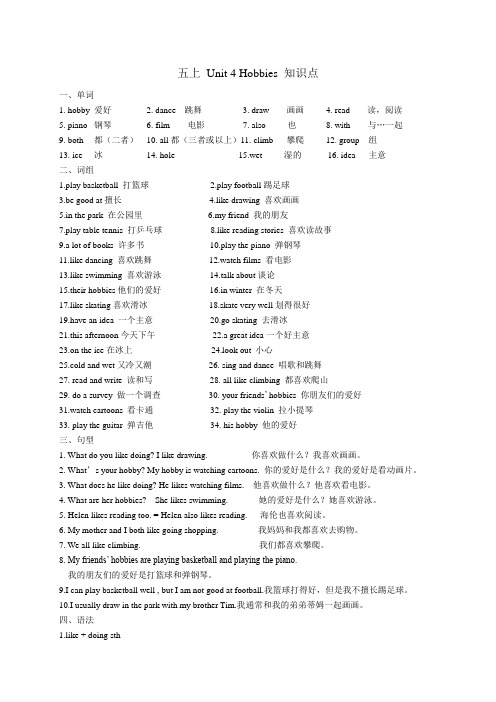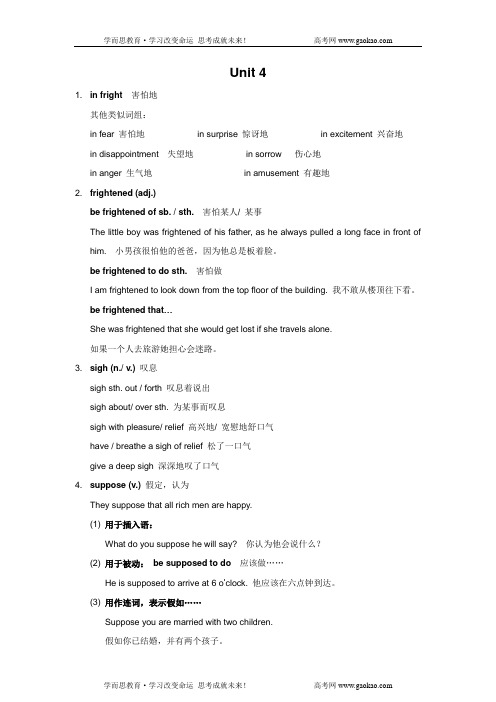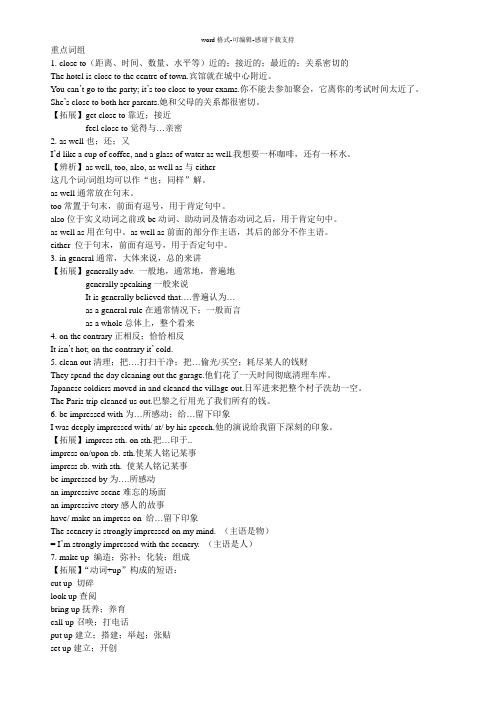Unit 4 知识点
Unit+4+Developing+ideas+Reading+知识点课件-

(1) Not only the students but also their teacher is enjoying the film. 不仅学生就连老师都在欣赏这部电影。
(2) Not only can we interact with art, but also take part in its creation. 我们不仅可以与艺术作品互动,还可以参与到艺术作品的创作中。
Unit 4 Meeting the muse
Developing ideas — reading
V Language points
Language points: Important words 1. separate adj 单独的;分开的;不同的
v (使)分开;(使)分离
separate … from 分开;区分 separately adv 分别地;独立地 separation n 分开;分离
Language points: Important sentences
With复合结构
1. with + 宾语 + 名词 He died with his son yet a schoolboy. 他去世时,儿子还是个小学生。 2. with + 名词 + 介词短语 He was asleep with his head on his arms. 他头枕着胳膊睡着了。 3. with + 名词 + 形容词(强调名词的特性或状态) He often sleeps with the windows open. 他常开着窗睡觉。 4. with + 名词 + 副词 He was lying on the bed with all his clothes on. 他和衣躺在床上。
Unit 4 Hobbies 知识点

五上Unit 4 Hobbies 知识点一、单词1. hobby 爱好2. dance 跳舞3. draw 画画4. read 读,阅读5. piano 钢琴6. film 电影7. also 也8. with 与…一起9. both 都(二者)10. all都(三者或以上)11. climb 攀爬12. group 组13. ice 冰14. hole 15.wet 湿的16. idea 主意二、词组1.play basketball 打篮球2.play football踢足球3.be good at擅长4.like drawing 喜欢画画5.in the park 在公园里6.my friend 我的朋友7.play table tennis 打乒乓球8.like reading stories 喜欢读故事9.a lot of books 许多书10.play the piano 弹钢琴11.like dancing 喜欢跳舞12.watch films 看电影13.like swimming 喜欢游泳14.talk about谈论15.their hobbies他们的爱好16.in winter 在冬天17.like skating喜欢滑冰18.skate very well划得很好19.have an idea 一个主意20.go skating 去滑冰21.this afternoon今天下午22.a great idea一个好主意23.on the ice在冰上24.look out 小心25.cold and wet又冷又潮26. sing and dance 唱歌和跳舞27. read and write 读和写28. all like climbing 都喜欢爬山29. do a survey 做一个调查30. your friends’ hobbies 你朋友们的爱好31.watch cartoons 看卡通32. play the violin 拉小提琴33. play the guitar 弹吉他34. his hobby 他的爱好三、句型1. What do you like doing? I like drawing. 你喜欢做什么?我喜欢画画。
英语九年级Unit 4重点短语和知识点梳理

英语九年级Unit 4重点短语和知识点梳理重点单词silent / 'saɪlənt/ adj. 不说话的;沉默的helpful / ˈhelpfl/ adj. 有用的;有帮助的score / skɔ:(r)/ n. & v. 得分;进球deal /di:l/ v.(dealt/delt/) 对付;对待shyness / 'ʃaɪnəs / n.含羞;腼腆dare / deə/ v. 敢于;胆敢crowd /kraʊd/ n.人群;观众ton /tʌn/ n.吨;(pl.)大量;许多private / 'praɪvət/ adj. 私人的;私密的require / rɪ'kwaɪə(r)/ v. 需要;要求British / ˈbrɪtɪʃ/ adj. 英国(人)的speech / spi:tʃ/ n. 讲话;发言ant / ænt/ n. 蚂蚁insect / ˈɪnsekt/ n. 昆虫seldom /'seldəm/ adv. 不常;很少influence /'ɪnflʊəns/ v. & n. 影响exactly /ɪgˈzæktli/ adv. 确切地;精确地absent /'æbsənt/ adj. 缺席;不在pride /praɪd/ n. 自豪;骄傲proud /praʊd/ adj. 自豪的;骄傲的introduction /ˌɪntrəˈdʌkʃn/ n. 介绍background / ˈbæk graʊnd/ n. 背景fail /feɪl/ v. 不及格;失败humorous / ˈhju:mərəs/ adj. 有幽默感的;滑稽有趣的interview / 'ɪntəvju:/ v. 采访;面试n. 面试;访谈public /'pʌblɪk/ n.民众adj.公开的;公众的guard /ɡɑ:(r)d/ n. 警卫;看守v. 守卫;保卫European / ˌjʊ(ə)rəˈpi:ən/ adj. 欧洲(人)African /ˈæfrɪkən/ adj.非洲(人)的n.非洲人Asian /ˈeɪʃn/ adj. 亚洲(人)的n. 亚洲人general /'dʒenrəl/ adj. 普遍的;常规的;总的n. 将军examination /ɪgˌzæmɪˈneɪʃn/ n. 考试;审查boarding /'bɔ:dɪŋ/ school 寄宿学校重点单词ed to do 过去常常做2. deal with 对付应付3. be proud of为……骄傲,感到自豪4. take pride in为……感到自豪5.from time to time 时常,有时6. in public 公开地7. in person 亲身,亲自8. take up sth.开始做,接受,占用9. worry about 为……担忧10. on the soccer team 在足球队11. hang out 闲逛12. think about 考虑13. make a decision 做决定14. to one’s surprise令某人吃惊的是15. even though 尽管16. tons of 很多17. a very small number of …极少数的…… 18. one of… ……之一19. be careful 当心重点知识点解析ev.& n. 使用,用途→ useful adj.有用的useless adj.无用的用法意思例句used to do sth .过去常常,过去曾经做某事I used to play basketball.(我过去常常打篮球。
高一英语(牛津)-Unit4-知识点梳理

Unit 41. in fright 害怕地其他类似词组:in fear 害怕地in surprise 惊讶地in excitement 兴奋地in disappointment 失望地in sorrow 伤心地in anger 生气地in amusement 有趣地2. frightened(adj.)be frightened of sb. / sth.害怕某人/ 某事The little boy was frightened of his father, as he always pulled a long face in front of him. 小男孩很怕他的爸爸,因为他总是板着脸。
be frightened to do sth. 害怕做I am frightened to look down from the top floor of the building. 我不敢从楼顶往下看。
be frightened that…She was frightened that she would get lost if she travels alone.如果一个人去旅游她担心会迷路。
3. sigh (n./ v.) 叹息sigh sth. out / forth 叹息着说出sigh about/ over sth. 为某事而叹息sigh with pleasure/ relief 高兴地/ 宽慰地舒口气have / breathe a sigh of relief 松了一口气give a deep sigh 深深地叹了口气4. suppose (v.) 假定,认为They suppose that all rich men are happy.(1) 用于插入语:What do you suppose he will say? 你认为他会说什么?(2) 用于被动:be supposed to do 应该做……He is supposed to arrive at 6 o’clock. 他应该在六点钟到达。
必修四Unit4知识点

1. close to(距离、时间、数量、水平等)近的;接近的;最近的;关系密切的The hotel is close to the centre of town.宾馆就在城中心附近。
You can’t go to the party; it’s too close to your exams.你不能去参加聚会,它离你的考试时间太近了。
She’s close to both her parents.她和父母的关系都很密切。
【拓展】get close to靠近;接近feel close to觉得与…亲密2. as well也;还;又I’d like a cup of coffee, and a glass of water as well.我想要一杯咖啡,还有一杯水。
【辨析】as well, too, also, as well as与either这几个词/词组均可以作“也;同样”解。
as well通常放在句末。
too常置于句末,前面有逗号,用于肯定句中。
also位于实义动词之前或be动词、助动词及情态动词之后,用于肯定句中。
as well as用在句中。
as well as前面的部分作主语,其后的部分不作主语。
either 位于句末,前面有逗号,用于否定句中。
3. in general通常,大体来说,总的来讲【拓展】generally adv. 一般地,通常地,普遍地generally speaking一般来说It is generally believed that….普遍认为…as a general rule在通常情况下;一般而言as a whole总体上,整个看来4. on the contrary正相反;恰恰相反It isn’t hot; on the contrary it’ cold.5. clean out清理;把….打扫干净;把…偷光/买空;耗尽某人的钱财They spend the day cleaning out the garage.他们花了一天时间彻底清理车库。
八年级英语下册Unit4单元知识点

八年级英语下册Unit4单元知识点八年级英语下册Unit4单元知识点八年级英语Unit4单元知识需要掌握每一个重要的知识点,会让你在Unit4单元英语考试中顺利通过。
以下是店铺给你推荐的八年级英语下册Unit4单元知识点归纳,希望对你有帮助!Unit4单元知识点:重点短语一1. have free time有空闲时间2. allow sb. to do sth. 允许某人做某事3. hang out with sb. 与某人闲逛4. after-school classes课外活动课5. get into a fight w ith sb. 与某人吵架/打架6. until midnight直到半夜7. talk to sb. 与某人交谈8. too many太多9. study too much学得过多10. get enough sleep有足够的睡眠11. write sb. a letter给某人写信12. call sb. up打电话给某人13. surprise sb. 令某人惊讶14. look through翻看15. be angry with sb. 生某人的气16. a big deal重要的事17. work out成功地发展;解决18. get on with不 11睦相处;关系良:19. fight a lot经常吵架/打架20. hang over笼罩21. refuse to do sth. 拒绝做某事Unit4单元知识点:重点短语二offer to do sth. 主动提出做某事so that以便mind sb. doing sth. 介意某人做某事all the time一直in future今后make sb. angry使某人生气worry about sth. 担心某事copy one’ s homework抄袭某人的作业be oneself做自己family membersspend time alone独自消磨时光give sb. pressure给某人施压have a fight w ith sb. 与某人吵架compete w ith sb. 与某人竞争free time activities业余活动get better grades取得更好的成绩give one’ s opinion提出某人的观点learn exam skills学习应试技巧practice sports体育训练cause stress造成压力cut out删除Unit4单元知识点:重点句型1. I studied until mid night last night so I did n‘t get enough sleep.我昨晚学习到半夜所以睡眠不足。
人教六下 Unit 4 知识点总结
Unit 4 Then and now一、核心词汇(重点词汇)grass草坪gym体育馆ago以前cycling骑自行车运动(或活动)ice-skate滑冰badminton羽毛球运动dining hall 饭厅go cycling去骑自行车二、了解词汇Internet互联网easy容易的star星different不同的active积极的race赛跑nothing没有什么thought想felt感觉dream梦cheetah 猎豹look up 查阅tripped and fell绊倒wake up醒来三、核心句型1. There was no library in my old school. 我以前的学校里没有图书馆。
解读:在过去的时间里某处没有某物的句型。
否定句句型结构: There + be 动词(was/were) + not + 主语 + 过去的时间 + 其他.举一反三: There was a tall building five years ago. 五年前这里有一座高建筑物。
(肯定句)There was not a tall building five years ago. 五年前这里没有一座高建筑物。
(否定句)= There was no tall building five years ago. 五年前这里没有高建筑物。
(否定句)通常情况下, there be句型的否定我们常用第二种形式。
即: There + be 动词(was/were) + no + 主语 + 过去的时间 + 其他.(注意,这里some和any 的变化, some 用于肯定句, any 用于疑问句和否定句。
)2. Before, I was quiet. Now, I m very active in class. 以前,我很安静。
现在,我在课堂上非常活跃。
解读:表示过去和现在对比的句型,注意一般现在时和一般过去时的区别。
八下英语unit4知识点总结
八下Unit4知识点总结一、★★★重点短语:1、遍及:all over 筋疲力尽:be tired out2、倒下:fall down 摔倒:fall over3、落后:fall behind (从...上)摔下:fall off4、逃跑:run away 逃脱;离开:get away5、一群..:an army of 一大群…:a huge army of…6、碰撞到岩石:crash against the rocks7、在某人的空闲时间:in one’s spare/free time8、开启一个全新的世界:open up a whole new world9、朝某人大叫:shout at sb. 不同类型的:d ifferent types of…二、★★★重要用法:1、“捆、绑、系”:tie的现在分词形式为tying,过去式为tied,过去分词为tied。
“把……绑/系在……上”:tie…to…2、“尽可能……“:as…as sb can/could =as ... as possible注意:两个as之间⽤形容词或副词原级。
3、让某人做某事:make sb do sth.4、继续做某事:continue doing sth.5、设法做成了某事:manage to do sth6、拒绝做某事:fefuse to do sth.7、把…翻译成…:t ranslate…into…8、对…感兴趣:be interested in…9、花费时间做某事:spend+时间+ doing sthtake +时间+ to do sth10、尽力做某事:try to do sth.尽某人最大努力做某事:t ry one’s best to do sth.11、“胃,腹部”:stomach ,复数形式是stomachs12、辨析either、also和too13、14、三、★★★重点语法:【特殊疑问词+不定式;must/have to】1、“特殊疑问词+动词不定式”作动词的宾语,结构为(wh-+to do)注意:特殊疑问词why 没有这种用法。
外研版(2024)七年级上册英语Unit 4 重点语法知识点背记提纲
外研版(2024)七年级上册英语Unit 4 重点语法知识点背记提纲Unit 4 Time to celebrate课时1Starting out & Understanding ideas: Reading重点单词1. unusual adj. 不平常的2. treat v. 请客,款待,招待3. myself pron. 我本人,我亲自,我自己4. dumpling n. 水饺5. whole adj. 全部的,整个的6. become v. 成为,变成7. chef n. 厨师8. balloon n. 气球9. cucumber n. 黄瓜10. hang v. 悬挂11. lantern n. 提灯;灯笼12. dish n. (烹制好的)菜肴,一道菜13. joke v. 说笑话;开玩笑14. shocked adj. 震惊的15. laugh v. 发出笑声,(大)笑16. pork n. 猪肉17. round adj. 圆形的,环形的18. shape n. 形,形状,外形19. reunion n. 团圆,团聚20. piece n. 片;块;段;截21. knife n. 刀22. smell n. 气味23. laughter n. 笑;笑声24. fill v. (使)充满;装满25. meal n. 一餐;饭26. miss v. 思念,想念,怀念(某人);错过27. taste n. 味道,滋味28. celebrate v. 庆祝单词变形1. usual—unusual (反义词)2. Britain—British (形容词,英国的,英国人的)3. can—could (过去式)4. hang—hung (过去式)5. chef—chefs (复数)6. dish—dishes (复数)7. laugh—laughter (名词,笑;笑声)8. knife—knives (复数)9. miss—misses (第三人称单数)10. celebrate—celebration (名词,庆祝)重点短语1. by the end of 到……结束为止2. be able to do sth. 能够做某事3. during the Spring Festival 在春节期间4. family reunion 家庭团聚5. my whole family 我整个家庭6. against the law 违法7. stand for 代表8. feel like 感觉像;想9. the way of doing sth. 做某事的方式10. fill…with… 用……把……充满重点句型1. I wanted to treat my British friend, Emilia, to a Chinese dinner.我想请我的英国朋友埃米莉亚吃一顿中式晚餐。
高一英语必修三unit4第四单元知识点
高一英语必修三unit4第四单元知识点词汇部分wildlife /'waildlaif/ n.野生动植物protection /pr?'tek?n/ n.保护wild /waild/ adj.野生的;野的;未开发的;荒凉的habitat /'h?bit?t/n.栖息地(动植物的)自然环境threaten /'θret?n/ vt. & vi.恐吓;威胁decrease /di'kri:s/ vi. & vt.减少;(使)变小;或变少endanger /in'deind??/ vt.危害;使受到危险die out 灭亡;逐渐消失loss /l?s/ n.损失;遗失;丧失reserve /ri'z?:v/ n.保护区hunt /h?nt/ vt. & vi.打猎;猎取;搜寻zone /z?un/ n.地域;地带;地区in peace 和平地;和睦地;安详地in danger (of) 在危险中;垂危species /'spi:?i:z/ n.种类;物种carpet /'kɑ:pit/ n.地毯respond /ri'sp?nd/ vi.回答;响应;做出反应distant /'dist?nt/ adj.远的;远处的fur /f?:/ n.毛皮;毛;软毛antelope /'?ntil?up/ n.羚羊Zimbabwe /zim'ba:bwei/ n.津巴布韦(非洲东南部国家)relief /ri'li:f/ n.(痛苦或忧虑的)减轻或解除;减轻痛苦的事物in relief 如释重负;松了口气laughter /'lɑ:ft?/ n.笑;笑声burst into laughter 突然笑起来;大声笑了出来mercy /'m?:si/ n.仁慈;宽恕;怜悯certain /'s?:tn/ adj.确定的;某一;一定importance /im'p?:t?ns/ n.重要(性)WWF (World Wildlife Fund) 世界野生生物基金会rub /r?b/ vt.擦;摩擦protect … from 保护……不受……(危害)mosquito /m?'ski:t?u/ n.蚊子millipede /'milipi:d/ n.(=millepede)千足虫insect /'insekt/ n.昆虫contain /k?n'tein/ vt.包含;容纳;容忍powerful /'pau?fl/ adj.强大的;有力的affect /?'fekt/ vt.影响;感动;侵袭attention /?'ten?n/ n.注意;关注;注意力pay attention to 注意appreciate /?'pri:?ieit/ vt.鉴赏;感激;意识到succeed /s?k'si:d/ vi.成功vt.接替;继任Indonesia /ind?u'ni: ??;-zi?/ n.印度尼西亚(东南亚岛国) rhino /'rain?u/ n.犀牛secure /si'kju?/ adj.安全的;可靠的income /'i?k?m; 'ink?m/ n.收入employ /im'pl?i/ vt.雇用;利用(时间、精力等)harm /hɑ:m/ n. & vt.损害;危害Milu deer麋鹿bite /bait/ vt. & vi.(bit,bitten) 咬;叮;刺痛extinction /ik'sti?k?n/ n.灭绝;消亡dinosaur /'dain?s?:/ n.恐龙come into being 形成;产生county /'kaunti/ n.县;郡inspect /in'spekt/ vt.检查;视察unexpected /?nik'spektid/ adj.没料到的;意外的incident /'insid?nt/ n.事件;事变dust /d?st/ n.灰尘;尘土;尘埃according to 按照;根据……所说Mauritius /m?'ri??s/ n.毛里求斯(非洲东部岛国) disappearance /dis?'pi?r?ns/ n.消失fierce /fi?s/ adj.凶猛的;猛烈的so that 以致于;结果ending /'endi?/ n.结局;结尾faithfully /'feiθf?li/ adv.忠诚地;忠实地Colobus /'k?l?b?s/ monkey (非洲产)疣猴,髯猴词组部分1. as a result结果As a result of= because of 由于result in = cause导致result form 由于2. die out (动,植物物种)灭绝die o 死于…(多内因)die from死于…(多外因)die dow变弱;逐渐消失 be dying for 渴望得到…3. be at a loss = be puzzled at =be confused迷惑的,不解的suffer a loss (of) 蒙受损失 make up for a loss 弥补损失be lost in one’s thought(陷入沉思) lose heartlose one’s heart to sb4.in peace 平静的(地);安静的(地)in silence/ in quiet/in surprise/in a hurry5.hunting for搜索; 搜寻6.be in danger of 有… 危险be out of danger脱离危险endangered adj. 濒危的 dangerous 危险的7.have / give an effect on / upon …take effect(生效)come / go into effect 生效;实施8.be concerned about担心.关心,挂念 9. get dressed穿上衣服get done强调动作,不能和表一段时间的状语连用;be done 表状态10.turn round : 转过去,围绕…旋转11.apply to应用be applied to被应用于apply for请求,申请….. apply to sb. for sth.12.protect ……from保护…..免受….危害prevent from阻止(stop/ keep from)13.have aeffect on对...有影响14.with a sad face looking at her. with + 宾语(O) + 宾语补足语/doc/dd5261298.html,e into being: 形成;产生;开始存在come into use:开始被使用come into one’s mind / head: 突然想到come into fashion: 开始流行come into consideration: 开始考虑必背知识点1. If the ir habitat is threatened or they can’t find enough food, their numbers may decrease. 如果他们的栖息地受到威胁或者他们找不到足够的食物,他们的数目就可能减少。
- 1、下载文档前请自行甄别文档内容的完整性,平台不提供额外的编辑、内容补充、找答案等附加服务。
- 2、"仅部分预览"的文档,不可在线预览部分如存在完整性等问题,可反馈申请退款(可完整预览的文档不适用该条件!)。
- 3、如文档侵犯您的权益,请联系客服反馈,我们会尽快为您处理(人工客服工作时间:9:00-18:30)。
Unit 4 知识点
一、短语
1.闲逛 hang out 2.太多 too many
3.争吵get into a fight 4.去睡觉 go to sleep
5.给某人打电话 call sb. ( up ) 6.擅长 be good at
7.谈论 talk about 8.在电话中 on the phone
9.吵架 have a fight 10.快速查看;浏览 look through
11.归还 give back 12.生某人的气 be angry with sb.
13.重要的事 big deal 14.因……而感谢 thanks for
15.没问题 no problem 16.成功地发展;解决 work out
17.和睦相处;关系良好 get on with 18.感到孤独 feel lonely
19.坐下 sit down 20.与某人交流 communicate with sb.
21.下次 next time 22.交朋友 make friends
23.担心 be worried about 24.为考试而学习 study for a test
25.害怕 be afraid of 26.在……前面in front of
27.不再…… not anymore 28.做运动 play sports
29. 看电影 watch movies 30.那么多 so many / much
31.做家务 do chores 32.删除;删去 cut out
33.几个;少数 a few 34.各种各样的 all kinds of
35.把…与…比较compare…with… 36.依…看 in one’s opinion
37.参加课外活动join after-school activities 38.关小 turn down
二、句式结构
1. allow sb. to do sth. 允许某人做某事
2. allow doing sth. 允许做某事
3. Why don’t you do sth. ? 你为什么不做某事呢?
4. find sb. doing sth. 发现某人在做某事
5. tell sb. ( not ) to do sth. 告诉某人(不要)做某事
6. refuse to do sth. 拒绝做某事
7. let sb. do sth. 让某人做某事
8. offer to do sth. 主动提出做某事
9. mind sb. doing sth. 介意某人做某事
10. not…until… 直到……才……
11. It’s time for sth. / It’s time to do sth. 该做某事了
12. It’s + adj. + to do sth. 做某事是……的
13. keep on doing 继续做
14. What do you think of…? 你认为……怎么样?
三、语法知识
1. 在英语中,提建议的常用表达有:
(1)Why don’t you do sth.? = Why not do sth. ?
你为什么不做某事呢?
例:Why don’t you talk to your parents ?
= Why not talk to your parents ?
你为什么不和你父母谈一谈呢?
(2)What / How about ( doing ) sth. ?(做)某事怎么样/好吗?
例:What / How about having dinner with me ?
和我一起去吃晚饭好吗?
(3)Let’s do sth. 咱们做某事吧。
例:Let’s make a birthday card for her .
咱们给他制作一张生日贺卡吧。
(4)You should ( not ) do sth. 你(不)应当做某事。
例:You should ( not ) do more exercise .
你(不)应当多锻炼。
(5)You’d better ( not ) do sth. 你最好(不)做某事。
例:You’d better ( not ) go out .你最好(不要)出去。
(6)Would you like sth. / to do sth.
你想要某物/做某事吗?
例:Would you like to have a try ? 你想要试一试吗?
(7)You could do sth. 你可以做某事。
例:You could write to her . 你可以给他写信。
2.常用答语:
肯定回答:
Good idea ! / That’s a good idea ! 好主意!/ 那是个好主意!
OK. / All right ! / Great. 好 / 行 / 太好了
Yes , please . / I’d love / like to . 是的。/ 我很乐意。
No problem .没问题。
Sounds / That sounds good / great /… (那)听起来不错/很好。。。
I agree with you .我同意你的看法。
否定回答:
I don’t think so . 我不这样认为。
I’d love / like to , but I have to … 我很愿意,但我得。。。
That sounds boring .那听起来很乏味。
I’m afraid …恐怕。。。
Sorry , I can’t . / Sorry , but… 抱歉,我不能。 / 抱歉,但是。。。
四.连词until , so that 及 although 引导的状语从句。
1.You should keep trying to talk to her until she talks
to you .
你应该继续同她说话,直到她和你说话为止。
2.He should talk to his friend so that he can say he’s
sorry .
他应该和他的朋友谈谈,以便他可以说声抱歉。
3.Although she’s wrong , it’s not a big deal .
尽管她做得不对,但也没什么了不起的。
以上三句中,until 引导时间状语从句,so that 引导目的状语从句,
although 引导让步状语从句。
